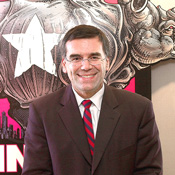
SUPERVISORS WHO FAIL TO TAKE EMPLOYEES' STRENGTHS, INTERESTS INTO ACCOUNT MAY
BE HURTING THE BOTTOM LINE
By CAROL HYMOWITZ, Staff Reporter of THE WALL
STREET JOURNAL
The hardest thing for executives to assess is how
effectively they lead others. Their bosses are more likely to judge them on how
well they meet profit goals and other quantifiable targets, rather than on how
well they develop talent.
Their employees, fearful of retribution, won't tell
them when they quash initiative, communicate poorly or behave intolerantly.
 Yet
bosses who fail to evaluate how they are perceived by subordinates are likely to
miss the chance to become inspiring leaders and to hinder their own success.
Yet
bosses who fail to evaluate how they are perceived by subordinates are likely to
miss the chance to become inspiring leaders and to hinder their own success.
"It's very rare to find a natural-born leader," says Gerald Chamales,
founder and chairman of Rhinotek Computer Products, a Carson, Calif.,
manufacturer of inkjet and laser cartridges.
He learned to tap into
employees' passions and strengths, and get the best out of them, only after
realizing that he was failing as a boss. "It was emotional pain, and recognizing
that what I was doing wasn't working, that caused me to change," he says.
Twenty years ago, when he founded Rhinotek in an apartment he was renting in
Venice Beach, Calif., Mr. Chamales says he was "completely green" about
management and so fell into a dictatorial style. "If an employee showed up at
work a few minutes late or didn't come back from a break on time, I would
withhold my approval on work he was doing," he says.
Tension would develop
between the two, subsequently causing the employee to be less productive. "I was
getting the opposite behavior that I wanted," he says.
He also threw temper
tantrums, screaming at employees who didn't follow orders or who failed to
measure up to his standards. His command-and-control style proved costly. "I
alienated and lost a lot of good people," says Mr. Chamales, who recently turned
50.
Eventually, he began asking himself whether he was the cause of his
company's high turnover. He decided to try other tactics. Rather than demand
that employees do things in a particular way, he learned what they enjoyed and
could devote themselves to wholeheartedly. "I started to see that being a leader
means playing off people's strengths instead of reprimanding them about their
weaknesses," he adds.
He also saw that different employees required
different styles of leadership. "Some people are motivated by achievement, some
by a little fear, others by money and many by recognition," he says. Today,
Rhinotek recognizes an outstanding employee from each department every month
with a bonus check and achievement plaque; every year one top-performing
employee is named and rewarded.
Mr. Chamales started to take time to walk
around his office and plant floor, eliciting feedback from his 200 employees.
"I've done everything in this company from sweeping the floors to typing
invoices, yet it's important to have humility and realize that the people doing
the jobs have the solutions," says Mr. Chamales, who has seen employee turnover
at his company decline dramatically in recent years.
When things don't go
his way, Mr. Chamales no longer loses his temper. He says he just takes a deep
breath or takes a break from a meeting, instead of letting his anger grow.
Many bosses don't understand the consequences of treating employees poorly
-- taking credit for their contributions, for example, or humiliating them in
front of others.
"They get away with all sorts of incivility and never
recognize how their behavior hurts the bottom line," says Kevin Schmidt, founder
and president of Envisionworks, a management and employee-relations consultant
based in Geneva, Ill.
To help companies identify weak or tyrannical
managers, Envisionworks has compiled an Organizational Civility Index which
surveys employees on how they treat each other. The index asks, for example, if
employees are reprimanded when they "are rude or disrespectful to other
employees," and whether colleagues "shout at each other and block each other's
success" or "compliment each others' work."
Most companies that score poorly
on the civility index are headed by executives who put harsh demands on
employees and belittle rather than praise staff, Mr. Schmidt says.
"Yet I've
never met a monster boss yet," he adds. "When I tell them, 'It must be awfully
hard to be you because people hate you,' they often break down."
Lillian
King, a consultant at Mercer Delta in New York, says bosses can learn to avoid
intimidating behavior. In a previous job at another company, she once walked out
of a meeting because of her boss's actions. "He started peeling the skin off of
another employee in front of me. I told him, 'This isn't a conversation you
should have in front of anyone else,' and it didn't happen again," she says.
But even a reformed bully may find a bad reputation hard to shake. "They may
always be seen as who they have been rather than who they have become," says Ms.
King. "They may need to take their changed selves to a new company."
Copyright © 2001 Dow Jones & Company, Inc. All Rights Reserved.